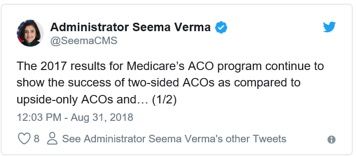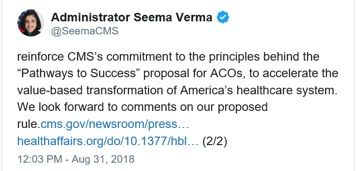- Center on Health Equity & Access
- Clinical
- Health Care Cost
- Health Care Delivery
- Insurance
- Policy
- Technology
- Value-Based Care
Proposed Rule for Medicare ACOs Includes Notable Changes for Rural Providers
CMS’ proposed rule described strong financial results from low-revenue ACOs, as well as ACOs in risk-bearing tracks, but it mostly ignored the success of small, rural providers in ACOs.
This article was written by Lynn Barr, CEO and founder of Caravan Health.
The future of the Medicare Shared Savings Program (MSSP) accountable care organization (ACO) program is coming into focus with the recent publication of a proposed rule by CMS. It is encouraging to see CMS include analysis and policy development on the needs of rural health providers, many of which have limited financial means and provide life-saving care in underserved communities. Data published by CMS shortly after the release of the rule showed that ACOs in rural communities and participating in a program intended to support small, rural ACOs—including many ACOs that include hospitals—are outperforming risk-bearing ACOs. But the CMS proposal to require rural ACOs to take downside risk will slow these initiatives and potentially jeopardize their continued existence.
In the August 2018 proposed rule, CMS reminds us that the program’s original rules encouraged the participation of rural providers in ACOs, saying the agency had “acknowledged that ACOs new to the accountable care model—and particularly small, rural, safety net, and physician-only ACOs—would benefit from additional time under the one-sided model before being required to accept risk.”
CMS’ proposed rule described strong financial results from low-revenue ACOs, as well as ACOs in risk-bearing tracks, but it mostly ignored the success of small, rural providers in ACOs. Still, several of the proposed program changes acknowledge the importance of nurturing these rural providers so they have a better chance of implementing real delivery and payment system reform.
Fundamental to the creation of a voluntary program is the creation of a business proposition attractive both to potential participants and to CMS. One of the most talked-about policy changes is the move from Tracks 1, 1+, 2, and 3 to the glidepath from the Basic to the Enhanced track in the proposed rule. The proposed rule reduces the shared savings rate in the early years of the program from 50% to 25%. This rate may be simply too low for rural providers considering participation—and virtually all rural providers will be unable to accept a transition to risk in the near future, no matter how limited.
This change in pace of taking on risk, while significant, is not the only policy lever at CMS’ disposal. Another notable policy change for rural providers is the proposed approach to benchmarking. Among other changes, CMS recognized that ACOs in rural areas, as well as other ACOs with dominant market position, account for a large share of their regional benchmark. CMS has proposed to reduce the weight of regional spending in updating an ACO’s benchmark. This means that an ACO’s own costs will contribute less to the regional benchmark. Although well-intentioned, by restricting the change to the update factor, CMS does not address the issue baked into the starting point for rural providers and, so, fails to fix the problem.
Caravan Health understands the challenges of forming and running ACOs with rural providers better than most. From the beginning, it has worked with providers in rural areas to facilitate participation for rural health providers who could otherwise be overwhelmed by the prospect of delivery system reform. The company was one of the first to recognize that the ACO model would only work for rural providers if they could band together in virtual groupings that are not bound by geography.
CMS states its support for rural providers in the recent proposed rule. The rule’s preamble states that one of the agency’s guiding regulatory principles is to “promote free-market principles by encouraging the development of physician-only and rural ACOs in order to provide a pathway for physicians to stay independent, thereby preserving beneficiary choice.”
Rural providers have equaled the performance of risk-bearing ACOs
CMS Administrator Seema Verma has touted the results of 2-sided risk ACOs—meaning those bearing risk in Track 3 and the Next Generation ACO models—as superior to 1-sided ACOs.


But there are other, nonrisk-bearing models performing as well as Track 3 that Verma ignored: rural and smaller ACOs in the ACO Investment Model (AIM) cohort of ACOs. This cohort of 45 ACOs received grant-funded assistance from CMS to kick start their operations in 2015 and 2016, guaranteed against any shared savings earned by those ACOs. Based on performance data released by CMS in August 2018, this group of small ACOs outperformed the 2-sided ACOs in Track 3 of the MSSP.
In January 2018, CMS counted 66 of the 561 MSSP ACOs as including rural providers. Rural hospitals are well-represented among Caravan Health ACOs—almost all of our 38 ACOs include rural hospitals. Our rural providers have been leaders in ACO success, earning high quality scores and reporting consistent and growing shared savings. In addition, 19 of the 23 Caravan Health ACOs that were assessed in 2017 beat their benchmarks, generating more than $50 million in savings for the program alongside quality scores averaging 94%.
Summary of 2017 financial and quality information
Savings per capita
Percent savings
Total savings
Shared savings
Number of
Beneficiaries
Average quality
AIM ACOs
$172
1.6%
$81 million
$38 million
470,000
94%
Track 3
$138
1.3%
$111 million
$93 million
805,000
95%
The underappreciated performance of the AIM program, alongside the commitment of many rural providers to improving the health of their communities, should give CMS pause in its efforts to reform the Medicare ACO program. In particular, CMS should consider changes that would strengthen the business case for rural participants, starting with maintaining a 50% sharing rate for rural and other safety-net participants, and addressing the problems with rural benchmarks that lead to cannibalization of future savings for ACOs that perform well.
